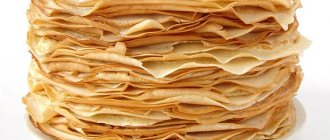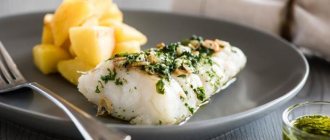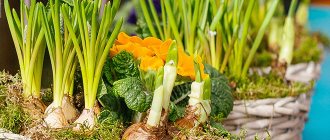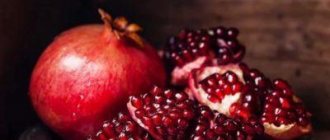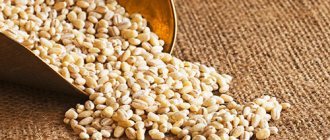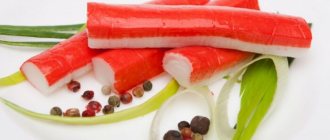Views - 27,711
Both during pregnancy and after childbirth, women need to divide their diet between two people. The “wrong” product can cause an upset stomach or even an allergy in a newborn. A nursing mother has to carefully select foods for her diet, monitor their freshness and even the method of preparation. What about harmless zucchini? After all, this is a vegetable, which means it contains vitamins. And how, in general, can a product that is 95% water harm it?
- Benefits of the product for nursing mothers
- Contraindications
How to select and store
- Video - nutrition for a nursing mother
Can a mother eat zucchini while breastfeeding?
During the postpartum period, a woman’s body urgently needs vitamins for recovery. The largest amount is found in vegetables and fruits. The influence of the foods consumed by the mother on the child’s body should be taken into account.
After all, along with mother’s milk, the nutrients it needs are transferred to the baby. When choosing vegetables, you need to consult your doctors about whether they can be consumed while breastfeeding.
Will they become an allergen for the fragile body of a newborn?
Zucchini is very useful for nursing mothers, and can be given to babies from 6 months
There is a lot of controversy regarding zucchini, and can a nursing mother eat zucchini? It has been proven that zucchini does not cause harm during breastfeeding.
Benefit
It is recommended to add zucchini to the diet of a nursing mother, as they contain:
- Microelements necessary for a child's growing body.
- Numerous vitamins that help the mother recover, and the baby needs them for the proper development of bone tissue.
- This vegetable is able to remove toxins and normalize the functioning of the intestinal tract.
Zucchini is a valuable food product
It is known that after childbirth, many women gain excess weight. The problem is of great concern to the fair half of humanity.
Eating zucchini while breastfeeding will help you lose extra pounds.
This happens thanks to the properties of zucchini:
- It has a diuretic effect, causing the body to get rid of excess fluid.
- It has a minimal calorie content of about 24 calories.
- The product is quickly and easily absorbed by the body. Therefore, the figure will soon acquire the desired shape.
- It saves you from cholesterol.
Zucchini is valued as an effective cosmetic product. It is recommended to apply its peel to problem areas of the face for 30 minutes. The skin will be well hydrated with nutrients and will become much fresher.
A zucchini mask will help lighten age spots that appear on the face during pregnancy. Thinly sliced fresh zucchini can restore dry skin on the face or décolleté.
Cooking
According to nutritionists, nursing mothers should eat at least 500 g of vegetables every day. Among them, zucchini comes first. First you should eat 1-2 spoons of the prepared dish.
After this, the baby’s condition should be monitored for 2 days. It is necessary to introduce only one new product into the diet in order to know the body’s reaction to it.
If no changes in the child’s behavior and condition have occurred, then the use of zucchini is allowed without fear.
Stewed zucchini - the best cooking option
Women during breastfeeding are advised to exclude all fried foods.
Stuffed zucchini is both tasty and healthy
That's why:
- Zucchini can only be eaten stewed, or you can make a stew from it.
- Vitamin and healthy dishes are prepared using a double boiler.
- An oven is used for baking vegetables, as their beneficial properties are preserved.
- You can cook dishes from this vegetable over an open fire (grill, campfire).
Squash caviar can be in limited quantities
Zucchini caviar is useful. When preparing it, you should exclude any dyes and other additives. But it should be used very carefully, due to the fact that it contains vinegar and tomato paste. It is added to the menu only six months later. The dose should not exceed 150 grams during the day, and no more than 400 grams per week.
Recommendations
Zucchini should be included in the diet of a nursing mother only 7 days after birth. The first time, the amount of food from this vegetable should not be large. Especially if it was not consumed during pregnancy.
You should not eat zucchini heavily, since by removing fluid from the body, there is an increased leaching of important microelements. This is especially true for potassium, which is necessary for normal heart function.
Zucchini juice is prohibited for nursing mothers
A woman should not eat this vegetable raw during breastfeeding. It is also prohibited to drink juice from it due to the high concentration of acid it contains.
It is recommended to use products from your own garden. When purchasing in a store or market, it is necessary to check the quality of zucchini (nitrates, freshness, ripeness).
Source: //selomoe.ru/kabachok/kabachki-pri-grudnom-vskarmlivanii.html
How to eat zucchini correctly during lactation
Zucchini can be introduced into the diet of a nursing mother a week after giving birth. True, it is better to eat stewed or boiled. And after three months, when the baby’s body gets stronger and adapts, you can experiment with dishes.
For the first time, try one or two spoons of stewed zucchini. And monitor the baby’s well-being for two days. At the same time, it is important to introduce only one new product to the menu in order to accurately determine the reaction. If there are no problems, then in the future you can eat zucchini while breastfeeding without fear.
Remember not to overuse this vegetable. Frequent use and large doses will lead to problems with the heart. In addition, you should not eat zucchini raw.
Be careful when choosing. It’s better if these are vegetables from your own garden. Then you will be confident in the freshness and composition of the product. Buy only seasonal vegetables from stores.
Choose ripe fruits with even color. Do not eat bruised zucchini. Before cooking, rinse thoroughly and rinse in boiling water.
Is it possible for a nursing mother to have zucchini in the first month after giving birth?
Both during pregnancy and after childbirth, women need to divide their diet between two people. The “wrong” product can cause an upset stomach or even an allergy in a newborn.
A nursing mother has to carefully select foods for her diet, monitor their freshness and even the method of preparation. What about harmless zucchini? After all, this is a vegetable, which means it contains vitamins.
And how, in general, can a product that is 95% water harm it?
Composition and calorie content of zucchini
In fact, many, and not only mothers, underestimate the composition of the product, believing that if a vegetable is so watery, then where do the vitamins come from in it? Actually this is not true.
This modest and inexpensive product contains a whole storehouse of useful substances for mother and baby:
VitaminsBenefits
| B vitamins | Promote the development of the nervous system |
| Sodium and potassium | Maintains water balance in the body and removes excess fluid from tissues |
| Calcium | Strengthens the skeletal system, participates in metabolic processes |
| Vitamin C | Boosts immunity and helps other vitamins and minerals be better absorbed |
| Magnesium | Strengthens the functioning of the cardiovascular system |
And this is not the entire list of useful substances that zucchini contains. The plant fibers in the fruits do not cause irritation to the gastric mucosa. For these and many other beneficial properties, zucchini is considered a wonderful dietary product. It is recommended for obese patients and diabetics. After all, one hundred grams of zucchini contains only 23 kcal.
Benefits of the product for nursing mothers
Many mothers suffer from the problem of extra pounds that they gained during pregnancy. Zucchini, in addition to the fact that it will in no way spoil the composition of breast milk, will help the mother regain her slim figure. But this is not the only benefit of zucchini during breastfeeding.
- Vitamins A, B, C will help a woman recover after pregnancy and improve the condition of her nails, skin, and hair.
- Zucchini removes toxins, thereby cleansing the body. Their pulp improves blood circulation and the digestion process.
- Excess fluid leaves the body due to the diuretic effect that the vegetable has.
A nursing mother can easily use zucchini not only for food, but also as a cosmetic product. While cooking, apply the vegetable peel to your face. The result is a natural moisturizing mask.
Contraindications
Many mothers suspect zucchini is an allergen. In fact, this product very rarely causes allergies. To give you an idea of how safe it is, pediatricians recommend it as one of the first complementary foods for children.
Another important point. If the mother did not eat zucchini during pregnancy, then it is worth introducing a new product during breastfeeding gradually, in small portions.
Despite all the positive reviews about zucchini and their beneficial properties, you should not abuse the product. Remember the golden rule that everything is good in moderation. Zucchini is healthy, but if you eat too much of it, it can have the opposite effect. Thus, useful substances will be removed from the body along with the liquid.
Nursing mothers are advised to eat half a kilogram of various vegetables per day. This 0.5 kg also includes zucchini. It is not recommended to eat raw vegetables, for example, in the form of juice. Canned and pickled zucchini are undoubtedly tasty, but useless.
How to select and store
Most of the vitamin C present in zucchini is contained in the peel. Therefore, it is advisable to choose young vegetables to cook them unpeeled.
- Make sure the product is ripe. Ripe zucchini contains much more vitamins and minerals. Buy vegetables only when they are in season. This way you can protect yourself from nitrates in the composition.
- The vegetable should be smooth and even, without spots.
- The beneficial properties of the product can be preserved by freezing it. It will be more convenient to store zucchini if you cut it into circles 5 centimeters thick, put it in a bag or plastic container and put it in the freezer. Vegetable cylinders of this size will be convenient to defrost for subsequent cooking.
How to cook zucchini while breastfeeding
This lightweight product fills you up surprisingly quickly. If you want to eat more high-calorie foods, start your meal with zucchini. They are fried, steamed, become components of vegetable stews, or processed into caviar.
They can be grilled, complement fish, meat, chicken dishes, or stuffed. A frying pan, a slow cooker, a double boiler, an oven - everything is suitable for preparing this miracle vegetable. And the taste is different and unique.
Zucchini dishes:
| Stew | When breastfeeding, mothers are often not recommended to eat fried foods, so it would be appropriate to prepare a stew with zucchini. It also contains other vegetables - potatoes, carrots, onions, eggplant. In addition to the fact that all these ingredients are healthy, they are also quick to prepare. Just fry them a little in oil, add a tablespoon of sour cream and a little water and simmer for about 30 minutes over low heat. |
| Zucchini pancakes | They are loved by adults, children and nursing mothers. They are very easy to prepare. Zucchini and onions are grated or rolled through a meat grinder. Add egg and flour to the vegetable mass. Mix to form a medium thick dough. Baking pancakes in a frying pan |
| Stuffed zucchini | If you want to have a zucchini feast for everyone, then cook vegetables with pork. Prepare the minced meat, add salt and a little butter. Steam the zucchini, stuff it with meat filling, sprinkle with breadcrumbs and put it in the oven. |
When breastfeeding, zucchini is completely harmless and even healthy. But if the mother eats them for the first time after giving birth, then the vegetable should be introduced into the diet a little at a time. When purchasing, it is preferable to choose young zucchini. It is healthier to eat them and make a face mask.
You can prepare many delicious dishes from zucchini, which will only improve the functioning of your mother’s body and have a positive effect on your figure. It is not advisable to eat them canned, but you can safely freeze them. When the child turns six months old, he himself will be able to try a healthy and tasty product.
After all, it is often recommended as the first complementary food.
- nutrition for a nursing mother
Source: //feedjc.org/mozhno-li-kabachki-kormjashhej-mame-v-pervyj-mesjac-posle-rodov/
How to eat zucchini for a nursing mother
The introduction of the product is allowed a week after birth. However, you are allowed to eat only stewed or boiled vegetables. After three months, the child’s body should get stronger and adapt, after which small culinary experiments are allowed.
Initially, it is recommended to stew the zucchini in order to eat it as a stew. In this case, for the first time one or two spoons will be enough. Over the next two days, it is advisable to monitor the baby’s well-being. In addition, during observation it is no longer allowed to expand the diet, since it will not be possible to correctly determine the reaction. If there are no problems, concerns can be ruled out.
You can learn about diet during lactation in our article. Read here what you can eat while breastfeeding.
What foods can a nursing mother eat in the first month, read the link
To eliminate unjustified risks, you should not abuse the vegetable in question. The fact is that frequent eating of the product in large quantities will lead to disruption of the functioning of many organs and incorrect metabolic processes.
In addition, raw fruits are potentially dangerous, so it is advisable to eat them only in cooked form.
Can a nursing mother eat zucchini and squash caviar: delicious recipes while breastfeeding
Every woman during breastfeeding has to take a more careful approach to her diet, since her menu also determines the baby’s diet. Some food is not suitable for the baby and can cause bloating or even allergies.
Sometimes a young mother may have concerns about the simplest and most familiar products.
Is it possible, for example, to eat zucchini while breastfeeding? Will they harm the baby? What dishes can a young mother prepare from these vegetables?
Even the simplest and most familiar products can cause doubts in a nursing mother. Is it possible to eat zucchini?
What are the benefits of zucchini?
Zucchini has a very low calorie content (24 kcal per 100 g of pulp), making it ideal for dietary nutrition. Young mothers who are overweight and want to lose weight can take note of this property. With a minimum amount of calories, the vegetable is distinguished by a rich set of useful substances - vitamins (A, C, B, K) and mineral salts.
All these valuable elements will have a positive effect on a woman’s appearance: her complexion will improve, minor blemishes and rashes will disappear, the skin will become more elastic, and the hair will acquire a healthy glow and strength. Vitamin C will help strengthen the immune system and give the body vitality and tone, because this is exactly what a woman lacks after pregnancy and childbirth.
Every mother wants to be healthy and beautiful after childbirth, and zucchini will help with this
Is there any harm from zucchini?
Despite the fact that zucchini has many useful qualities, a nursing mother does not need to consume it too often, since the vegetable can also have a negative effect on her body. This is due to the fact that the product (together with cucumber) is one of the most powerful diuretics.
The vegetable removes from the body, in addition to toxic substances and toxins, useful and vital elements, such as potassium. A deficiency of this substance can cause heart failure and other serious ailments.
Other health problems may arise when eating zucchini:
- the occurrence of pain in the epigastric region (they can be caused by the acid contained in raw vegetables);
- the appearance of diarrhea in the mother, intestinal colic, bloating and liquid foamy feces in the baby;
- the occurrence of allergies (due to the consumption of low-quality vegetables).
Such side effects appear only with excessive consumption of zucchini; the optimal dose that a nursing mother can safely eat is 200-300 g of vegetables at a time. It is recommended to introduce the product into the diet no more than 3 times a week.
Choosing the right zucchini
A woman during lactation should approach the issue of selecting products for her diet with maximum responsibility and carefully monitor their quality.
Zucchini that is grown on your own plot is the healthiest, as it is fresh and without nitrates
When choosing zucchini, you need to pay attention to the following characteristics:
- Peel – should be elastic and smooth, without dark spots or signs of pest damage, rot or mold.
- Color - can vary from light green to rich green up to swamp, while yellow color is a sign that the vegetable has been frozen or has begun to rot.
- Size - it is better to choose vegetables of medium length, this is about 25-30 cm, these are considered the most useful and of high quality, and fruits that are too large have a lot of seeds.
In the summer, you should eat zucchini from your own plot; if you don’t have one, you can buy vegetables at the market from summer residents. These products are usually free of nitrates and other harmful substances because they are not treated with chemicals.
Can nursing mothers eat fried zucchini?
A small child’s digestion depends on the foods his mother eats, so she needs to avoid fried foods
Is it possible to eat squash caviar during lactation?
Some mothers do not know whether it is possible to eat squash caviar during lactation. Breastfeeding specialists and pediatricians see nothing wrong with this product. When preparing caviar, all the valuable qualities of zucchini are preserved.
In addition, it also contains other healthy vegetables, such as eggplants, carrots, onions, bell peppers (we recommend reading: bell peppers during breastfeeding).
Undoubtedly, such a set of ingredients will have a beneficial effect on the functioning of the intestines and other digestive organs due to their high fiber content.
However, in order to safely include squash caviar in the diet of a nursing woman, it is important to take into account several nuances. Ideally, the dish should be home-cooked, this reduces the likelihood of low-quality ingredients getting into the food.
If it is not possible to make caviar yourself, then you should give preference to a product made from boiled vegetables rather than fried ones.
Such caviar will retain more vitamins and other useful elements, and it will be easier for the digestive system to digest such food.
Healthy zucchini dishes
What can women during lactation prepare from zucchini and eat without harm to their health? Let's look at a few recipes: vegetable casserole, zucchini pancakes and zucchini caviar, which can be prepared for the winter. Coping with such dishes will not be difficult even for an inexperienced housewife.
Zucchini casserole
We will need:
- 0.6 kg zucchini;
- 300 g minced meat;
- 4 large tomatoes;
- 100 g rice;
- 2 eggs;
- 50 g cheese;
- salt;
- vegetable oil.
Cooking method:
- Pour boiling water over the rice cereal and leave for 20 minutes.
- Grind the zucchini on a grater (preferably a coarse one), add salt and squeeze, removing excess liquid.
- Cut the tomatoes into slices.
- Finely grate the cheese and mix with beaten eggs.
- After draining the water from the rice, combine it with the minced meat.
- Place the chopped zucchini in a heat-resistant dish, greased with oil, then the minced meat with rice, then the tomatoes.
- Coat the casserole with the egg and cheese mixture.
- Place in the oven preheated to 200 degrees for 35 minutes.
Zucchini pancakes
Zucchini pancakes can be served with sour cream
For this dish you will need:
- 500 g zucchini;
- large egg;
- greens - to taste;
- pepper, salt, other spices (all to taste).
Preparation:
- wash the vegetables and grate them on a fine grater;
- finely chop the greens;
- combine zucchini with herbs, add egg, salt and spices, mix everything;
- Fry the pancakes in a frying pan without oil until golden brown.
Squash caviar for the winter
Homemade squash caviar will be an excellent appetizer for a family breakfast.
Required ingredients:
- 6 kg of zucchini;
- 500 g tomato paste;
- 200 g sugar;
- half a glass of vegetable oil;
- 10 tablespoons of 9% vinegar;
- 3 tablespoons salt;
- 3 cloves of garlic;
- 0.5 teaspoons ground black pepper.
Cooking method:
- Grind vegetables in a meat grinder.
- Pour the mixture into a large saucepan, add butter, salt, sugar, pepper, and put on fire.
- When the mixture boils, reduce the heat and simmer for another 40 minutes.
- Grind the mixture using an immersion blender (if you need caviar with a hard consistency, you don’t have to do this).
- Add chopped garlic, vinegar and cook for another 10 minutes.
- Place the caviar in (sterilized) jars, cover them and leave until completely cool.
A nursing mother is not prohibited from including zucchini in her menu; however, it is worth observing moderation when consuming them, and also carefully ensuring that the vegetables are fresh and of high quality. It is also necessary to pay attention to the reaction of the baby’s body, and at the first signs of an allergy, the product should be immediately excluded from the diet until the end of the lactation period.
Share with friends on social networks
Source: //baby-bob.ru/mozhno-li-kormyaschey-mame-kushat-kabachki-i-kabachkovuyu-ikru-vkusnye-recepty-pri-grudnom-vskarmlivanii/
Zucchini and caviar from them: are they allowed for a nursing woman? Recipes for dishes during breastfeeding
All mothers during lactation should be more attentive to their diet, since the child’s diet depends on their nutrition.
Some foods are not suitable for newborns and can lead to allergic reactions and tummy pain. Even the most ordinary foods can cause anxiety in a nursing mother.
In particular, is it worth eating zucchini while breastfeeding? Is this harmful for the child? What can a nursing woman prepare from zucchini?
Potential Harm
Despite the large number of positive properties, you should not eat a lot of zucchini during lactation, as it may not have a very good effect on the body. This is because, like cucumbers, it is a strong diuretic.
Zucchini, along with harmful toxins and waste, flushes out substances that are necessary and important for the body. This can lead, for example, to potassium deficiency, which in turn can lead to the development of heart failure and other diseases.
Also, the acid contained in thermally unprocessed vegetables can cause abdominal pain, and intestinal disorders can develop in both mother and child. Allergic reactions are possible when using low quality zucchini.
These scenarios are only possible if the vegetable is consumed too much. A safe portion for a woman during lactation will be 200–300 grams per meal. It is recommended to include zucchini in the menu no more than three times every 7 days.
How to choose
A nursing mother must carefully select the foods in her diet and carefully monitor their quality.
Zucchini grown in your own garden is the most useful, as it is freshly harvested and does not contain nitrates.
What you should pay attention to when choosing a vegetable:
The skin is elastic and without roughness, without dark spots or damage by insects. Not rotten or moldy.
The color of the squash should range from pale green to bright, possibly green-brown. Yellow color means that the zucchini is frozen or starting to rot.
The optimal size of zucchini will be 25–30 centimeters; such a fruit will be of better quality and will bring maximum benefit. A large zucchini has too many seeds.
In the summer you need to eat vegetables from your own garden; if you don’t have one, you should buy zucchini at the market from a summer resident. They, as a rule, do not contain nitrates and other harmful substances, because they are not treated with chemicals.
Are fried zucchini allowed during lactation?
A nursing mother needs to remove fried vegetables from her diet. Fatty foods increase the fat content in breast milk. Such food will be difficult for the child’s fragile digestive system; it is still difficult for the stomach to digest.
Also, when frying, a large amount of useful substances evaporate from zucchini and harmful carcinogens are formed (mainly when frying over high heat).
Breastfeeding women need to choose other, healthier cooking techniques. As an option, bake or stew vegetables, which tastes just as good as fried vegetables, but is more beneficial and is better digested by the child’s stomach.
The baby's digestion of food depends on the food the mother eats, so you should avoid fried foods.
Is squash caviar allowed for a nursing mother?
Many breastfeeding women do not know whether zucchini caviar is allowed for them. Nutrition experts and pediatricians do not see anything negative in this food product. When harvesting it, all the beneficial properties of zucchini are not lost.
The recipe also includes such valuable products as eggplant, carrots, onions and bell peppers. Without a doubt, this combination of vegetables will have a positive effect on the digestive system due to the large amount of fiber it contains.
However, in order to safely consume caviar from zucchini, a young mother needs to take some points into account. The ideal option would be a product that is prepared at home, so there is less chance that the caviar will contain low-quality vegetables.
But when you can’t prepare a dish yourself, you should choose a preparation made from boiled rather than fried vegetables. It will contain more vitamins and nutrients, and digestion will be easier.
Subscribe to “Baby Feeding” on !
Healthy recipes
What can a nursing mother cook and eat from zucchini without fearing for her health? Let's study some recipes: casserole from vegetables, pancakes from zucchini and caviar from them, prepared for the winter. These dishes are not difficult to prepare even for a novice cook.
Zucchini casserole
It will require:
- Zucchini – 600 grams;
- Minced meat – 300 grams,
- Tomatoes (large) – 4 pcs.;
- Rice cereal – 100 grams;
- Egg – 2 pcs.;
- Cheese – 50 grams;
- Salt;
- Vegetable oil.
Preparation:
- Pour boiling water over the rice and soak in it for twenty minutes.
- Grate the zucchini (coarse is preferable), add salt and strain, removing unnecessary juice.
- Cut the tomatoes into circles.
- Grate the cheese onto a fine grater and mix with beaten eggs.
- Mix the rice (after draining the water) and minced meat.
- Grease a heat-resistant dish with oil and place first the grated zucchini, then the mixture of minced meat and rice, then the tomatoes.
- Brush the dish with eggs mixed with cheese.
- Place in an oven heated to two hundred degrees. Baking time – 35 minutes.
Zucchini fritters
Zucchini pancakes can be eaten with sour cream.
Ingredients:
- Zucchini – 0.5 kg;
- Large egg – 1 pc.;
- Herbs, salt and seasonings - to your taste.
Method of preparation: wash and chop the zucchini using a grater, add chopped herbs, an egg with salt and spices. Mix the ingredients. Fry the pancakes in a dry frying pan until browned.
Zucchini caviar
Homemade zucchini caviar is a wonderful breakfast dish for the whole family.
We will need:
- Zucchini – 6 kg;
- Tomato paste – 0.5 kg;
- Sugar – 0.2 kg;
- Vegetable oil – 0.5 cups;
- Vinegar 9% – 10 tbsp. spoon;
- Salt – 3 tbsp. spoons;
- Garlic – 3 cloves;
- Ground black pepper – 0.5 teaspoon.
Preparation: pass the zucchini through a meat grinder and transfer them to a large container, pour in the oil, salt, add sugar and spices. Place the mixture on the stove. After boiling, reduce the gas and cook for another 40 minutes.
Grind the mass with a blender (if you want a harder texture, you can skip this step). Add the crushed garlic mass, vinegar solution and cook for about ten minutes.
Place the resulting dish in sterilized jars, wrap and cool.
Adding zucchini to your diet during lactation is not prohibited, but you need to be moderate in consumption and control the freshness and quality of the vegetables. It is important to monitor how the child’s body reacts and if there are initial allergic reactions, immediately stop eating zucchini until you finish breastfeeding.
prikormrebenka.ru 2017-06-18
(1 5,00 of 5) Loading...
Source: //prikormrebenka.ru/kabachki-pri-grudnom-vskarmlivanii/
Mother's nutrition after childbirth: zucchini during breastfeeding at 1 month
It is a well-known fact that a nursing mother should eat a balanced diet, only natural products that contain vitamins, minerals and other beneficial microelements.
Such products include zucchini. This is the first vegetable that is introduced into a baby’s diet during complementary feeding, because it consists of 95% water and does not cause allergic reactions. But during the lactation period, you want to surround your newborn with maximum care and comfort, so many are interested: “Can a lactating mother eat zucchini during breastfeeding?”
Can a nursing mother use it in the first month after giving birth?
Let's look at whether the product can be used when a newborn is pregnant at 1 month. Zucchini must be eaten while breastfeeding. Especially if the mother ate this vegetable during pregnancy, this way the risk of allergies in the child is minimized.
After the first tasting of a zucchini dish, it is worth monitoring the newborn’s reaction; if there is no causeless crying, colic or rash, the vegetable can be eaten, gradually increasing the portion every day. Just be sure to monitor the quality of the vegetable. It is necessary to recoup the fruits only during the season.
Reference! You need to introduce zucchini into your diet gradually, starting with a couple of spoons of this vegetable stewed, boiled or baked.
From what day can it be introduced into the daily diet?
Zucchini, zucchini and squash are introduced into the daily diet from the 8th day after birth. It is worth noting that when preparing a dish from these vegetables, you do not need to overdo it with spices; only a little sea salt and a couple of sprigs of dill are allowed. Before cooking the zucchini, be sure to pour boiling water over the skin and wipe it with a hard sponge.
Product benefits
The benefits of zucchini have been noted by many pediatricians and nutritionists; they are as follows:
- They are a source of minerals - iron, magnesium, potassium and calcium, which contribute to the normal development of the child.
- These vegetables contain a vitamin complex, which consists of B vitamins, as well as A and C - they are needed for strong teeth, nails, hair, and clean skin.
- Zucchini is a natural absorbent that removes toxins from the body.
- It contains fiber, which improves digestion and is a preventative against postpartum constipation.
- This is a dietary vegetable (24 kcal per 100 g), which is especially important during postpartum recovery and the return of a slim figure.
- Zucchini is easily absorbed by the body as it contains a lot of water.
ATTENTION! You should not overuse zucchini, despite all its usefulness, because the diet must be harmoniously balanced!
Why is it dangerous?
Zucchini has a significant diuretic effect, so it can flush out many nutrients from the body. Also, abuse of this vegetable leads to problems in the cardiovascular system, due to a decrease in potassium levels. It is not recommended to consume raw or pickled zucchini.
After all, the former lead to an upset stomach, and the latter are useless. There is also no point in drinking zucchini juice or fresh juice - for the reasons already given.
Selection and storage
Several recommendations for selecting and storing zucchini:
- You should pay attention to ripe vegetables, without spots or growths, with smooth skin;
- they can be any color: yellow, dark green or white;
- You need to purchase vegetables in stores and markets only in season (during the rest of the year, the amount of nitrates in them can go off scale);
- Zucchini is stored in the refrigerator, away from the freezer;
- their shelf life is short, they quickly wither and spoil in literally 3-4 days;
- To preserve zucchini with all the useful substances, it is recommended to freeze them, first cutting them into pieces, and in winter you can always treat yourself to a delicious casserole.
IMPORTANT! You should not buy fruits that are too large; they contain a lot of large seeds that cause flatulence in both mother and child!
Recommendations for use during lactation
During gw, zucchini should not be eaten fried, no matter how tasty it may be - you should refrain. It is better to give preference to homemade squash caviar, or casseroles, pancakes, and stews. There are a lot of interesting, light and low-calorie recipes from this vegetable on the Internet.
Daily and weekly norm
The daily allowance of vegetables for a lactating mother is 0.5 kg, this includes absolutely all permitted vegetables, including zucchini. It is clear that half a kilo of zucchini a day is a lot, so you should dilute it with, for example, cauliflower or broccoli.
You are allowed to eat no more than 1 kilogram of zucchini per week. This is necessary for the normal functioning of the intestines and the body as a whole. The norm can only be exceeded in winter, when, apart from zucchini, the mother has no other healthy vegetables in stock.
Conclusion
Having understood the benefits of zucchini, you can not be afraid and introduce them into your diet from the second week from the date of birth.
This is a hypoallergenic product, it is absolutely safe for the child and will not cause him any harm, unless, of course, the mother consumes it consciously in the recommended amount.
And for mom, a pleasant bonus will be the use of masks made from squash pulp, which perfectly refresh the complexion and also give the skin softness and radiance.
Source: //pregnancymethod.com/pitanie-materi-posle-rodov-kabachok-pr/
Is it possible to eat zucchini while breastfeeding?
Many doctors allow this vegetable to be included in the diet of young mothers. So the benefits are as follows:
- The presence of microelements is noted: potassium, calcium, iron, magnesium. These substances are required for the successful and full development of the child.
- Vitamins A, B, C. These substances are considered beneficial for teeth, nails, hair, and skin. In addition, they are required for the mother, who must recover after pregnancy and childbirth. A newborn baby can develop only if it receives the maximum amount of nutritional components.
- The vegetable is considered an absorbent. It is assumed that it is possible to remove toxic substances from the body, resulting in improved digestion, normalization of blood circulation, and strengthening of the immune system.
- For women experiencing excess weight after childbirth, additional benefits are noted. So, it is supposed to have a diuretic effect and eliminate excess fluid from the body. In addition, the product is low in calories and easily digestible, so you can feel full and avoid negative effects on your figure.
Despite all the numerous advantages, there is a lack of opportunity to get carried away with the use of the product. The fact is that an excess of eaten vegetable delicacies will lead to the opposite effect. For example, excessive removal of fluid from the body will contribute to the elimination of useful substances necessary for the full functioning of various organs.
In most cases, beneficial properties are noted. Zucchini during lactation contributes to the supply of the optimal amount of vitamins for a woman who has recently given birth and her child. In addition, it is possible to prepare healthy vegetable dishes, which are considered a worthy basis for any diet.
